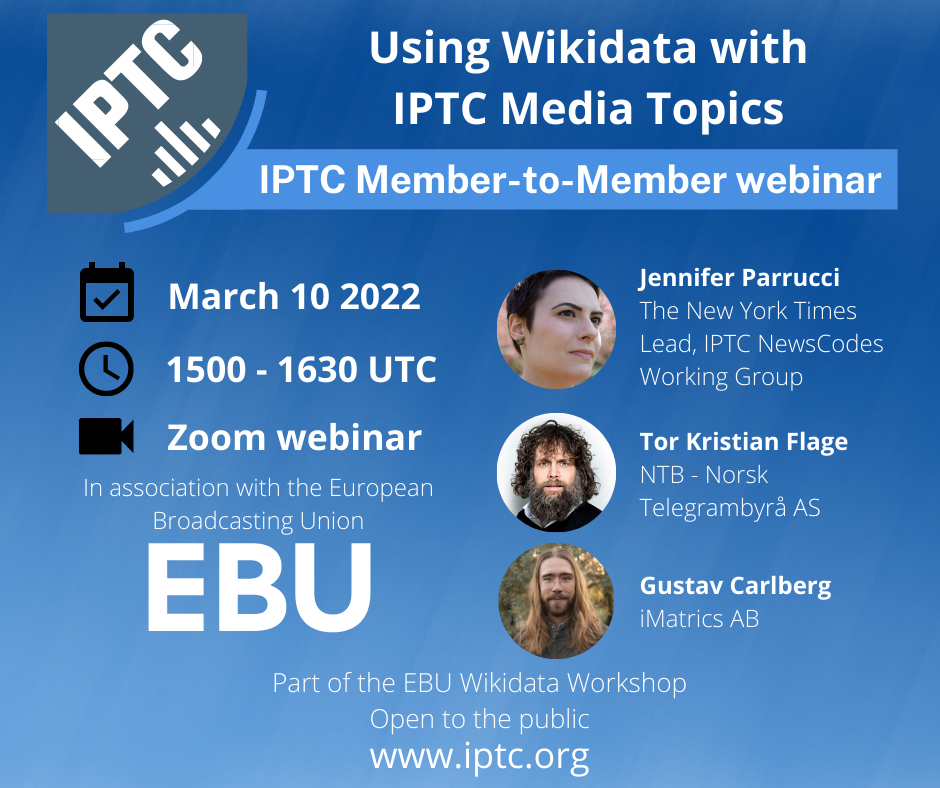Categories
Archives
Next Thursday 10th March, IPTC members will be presenting a webinar on IPTC Media Topics and Wikidata. It will be held in association with the European Broadcasting Union as part of the EBU Wikidata Workshop.

The webinar is part of our series of “member-to-member” webinars, but as this is a special event in conjunction with EBU, attendance is open to the public.
The IPTC component of the workshop features Jennifer Parrucci of The New York Times, lead of the IPTC NewsCodes Working Group which manages the Media Topics vocabulary, and Managing Director of IPTC Brendan Quinn, introducing Media Topics and how they can be used with Wikidata. Then Tor Kristian Flage of Norwegian agency NTB and Gustav Carlberg of vendor and IPTC member iMatrics will present on their recent project to integrate IPTC Media Topics and Wikidata into their newsroom workflow.
Other speakers at the workshop on March 10th include France TV, RAI Italy, YLE Finland, Gruppo RES, Media Press and Perfect Memory.
Register to attend the full workshop (including the IPTC webinar) for free here.
The IPTC has released a comprehensive set of sports controlled vocabularies as a supplement to the SportsML 3.0 sports-data interchange format, which was released in July 2016. These controlled vocabularies (CVs) are in the format of NewsML-G2 NewsML-G2 Knowledge Items plus RDF variants and are available on IPTC’s CV server at http://cv.iptc.org/newscodes.
There are 113 CVs representing such core sports concerns such as event and player status, as well as specialized lists for 11 sports (basketball, soccer, rugby, American football, etc.) for statistics, player positions, scoring types, etc.
“The SportsML 3.0 standard’s semantic tech capabilities are improved greatly by the new controlled vocabularies,” said Trond Husø, system developer for Norwegian news agency NTB, one of the early adopters of SportsML 3.0. “Data can be easily imported, structured, and stored.”
“When building a sports app you spend a lot of prep time defining your terms and building a schema,” said Paul Kelly, news technology consultant and lead for IPTC’s Sports Content Working Group. “By using SportsML 3.0, there is no need to reinvent the wheel.”
“You consider things such as ‘What sort of results and stats do we need?’ and ‘How will our system handle interrupted matches?’ IPTC’s vocabularies can get you on your way because they properly define in a standard format almost all the terminology you would use in a sports application: Everything from “goals-scored” to a full enumeration of status codes for sports events,” Kelly said.
For the Summer 2016 Olympics, NTB acquired the rights to distribute the results and data from the International Olympics Committee’s Olympic Data Feed (ODF). NTB then transformed ODF to SportsML 3.0, and then to NITF3.2. “Using SportsML to structure the ODF’s data is a broad and comprehensive solution to approaching all sports and competitions worldwide,” said Husø, who is also a member of IPTC’s Sports Content Working Group. “SportsML is now a truly flexible and universal format that can incorporate multiple vendor codes and still provide a defense against vendor lock-in.”
“Terms defined in another format such as ODF can easily live beside SportsML terms – as well as any other proprietary format – so that an organisation can build a repository of knowledge of all the different sports-data formats,” Kelly said.
Another advantage to the new SportsML 3.0 standard is that if new concepts are added to a sports vocabulary or modified in it, the data model and the XML Schema don’t change; they stay stable. It also supports all languages for the concept labels.
“A great feature is that we can translate the definitions to Norwegian – without changing or breaking the vocabulary,” said Husø. “If we were to distribute internationally, our domestic receivers could look up the definitions in Norwegian, while the international ones could use the English term.”
IPTC’s SportsML 3.0 standard underwent a major upgrade from version 2.2, after 12 years of evolution since its first version. The new standard incorporates contribution from sports experts in 12 countries. Its flexible core covers all major sports and events in most news reporting.
Other early adopters of SportsML 3.0 include Univision and the British Press Association in its new multi-sport API. Its major features include:
- compliance with IPTC’s NewsML-G2 standard
- a flexible core that covers all major sports and events in most news reporting
- plugins for detailed stats in 10+ sports
- a more flexible tournament model
- schedules, scores, standing, statistics, etc.
- choices between specific and generic terms
- controlled vocabularies, semantic tech capabilities
- schema redesign
- many samples and tool support.
Tool support for SportsML 3.0 includes 45 samples from 11 different sports and events, including both classic and SportsML-G2 examples, and both generic and specific examples.
The vocabularies will be maintained by IPTC for future expansion; new sports and terms can be added.
For more information on SportsML 3.0:
SportsML 3.0 Standard, including Zip package
SportsML 3.0 Specification Documents
NewsML-G2 Standard
Contact: Trond Husø @trondhuso, Trond.Huso@ntb.no

It’s an Olympic year for IPTC’s SportsML 3.0 standard, the recently released update to the most comprehensive tech-industry XML format for sports data.
Norsk Telegrambyrå (NTB), in Norway, is one of the first news organizations to implement SportsML 3.0, in time for the 2016 Games in Rio.
“We figured, why not use the latest technology available?” said Trond Husø, system developer for NTB, who worked on the standard’s update, released in July. “SportsML 3.0’s use of controlled vocabularies for sport competitions and other subjects now provides many benefits, including more flexibility. Storing results is also more convenient.”
SportsML 3.0 is the ideal structure and back-end solution used by many major news organizations because it is the only open global standard for scores, schedules, standings and statistics. “It saves the time and cost of developing an in-house structure,” said Husø, also a member of IPTC’s Sports Content Working Party.
The Rio Games, which will host about 10,500 athletes from 206 countries, for 17 days and 306 events, are revolutionary for big data and new approaches for managing it. For the first time, the International Olympic Committee (IOC) used cloud-based solutions for work processes including volunteer recruitment and accreditation.
And consider the experimental technologies and apps launched by key broadcasters and Olympic Broadcasting Services, the Olympic committee responsible for coordinating TV coverage of the Games: virtual reality footage, online streaming, automated reporting, drone cameras, and Super-High Vision, which is supposedly 16 times clearer than HD.
Billions of Olympic spectators worldwide have naturally come to expect real-time results and accurate scores to be delivered to them, with a side of historical perspective. All with little thought as to how the information reaches the public, be it via tickers on websites, graphic stats on TV screens, or factoids offered by commentators.
Schedules, competitors’ names, bio information, times, rankings, medalists – how does all of this data get served up so quickly and uniformly among networks and news services? And how does it get integrated into existing news systems, namely SportsML 3.0?
It starts with the IOC – the non-profit, non-governmental body that organizes the Olympic Games and Youth Olympic Games. They act as a catalyst for collaboration for all parities involved, from athletes, organiser committees, and IT, to broadcast partners and United Nations agencies. The IOC generates revenue for the Olympic Movement through several major marketing efforts, including the sale of broadcast rights.
The IOC produces the Olympic Data Feed (ODF), the repository of live data about past and current games. The IOC is responsible for communicating the official results; they use the specific ODF format for their ODF data.
Paying media partners sign a licensing agreement to use ODF, to report on results through their own channels, and build new apps, services and analysis tools.
The goal of ODF is to define a unified set of messages valid for all sports and several different news systems – so that all partners are receiving the same data, at the same time. It was introduced for the Vancouver Games in 2010 and is an ongoing development effort.
According to the IOC’s website, ODF plays the part of messenger. From a technical standpoint, the data is machine-readable. ODF sends sports information from the moment it is generated to its final destination via Extensible Markup Language (XML). XML, a framework for storing metadata about files, is a flexible means to electronically share structured data via the Internet, as well as via corporate networks.
IPTC’s SportsML 3.0 easily imports data from ODF. Using SportsML to structure the ODF’s data is a broad and comprehensive solution to approaching all sports and competitions worldwide. ODF has identifiers for sports and awards (gold, silver, and bronze medals) executed at the Olympic Games; sports outside of ODF are identified by vocabulary terms of SportsML.
“SportsML 3.0 provides one structure for the data for developers to work in,” said Husø. “The structure will be the same, even if there are changes to ODF in future Olympic Games; the import and export process of the data will not change.”
Among content providers that use SportsML (various versions) are NTB, AP mobile (USA), BBC (UK), ESPN (USA), PA – Press Association (UK), Univision (USA, Mexico), Yahoo! Sports (USA), and Austria Presse Agentur (APA) (Austria), and XML Team Solutions (Canada).
SportsML 3.0 is based on its parent standard, NewsML-G2, the backbone of many news systems, and a single format for exchanging text, images, video, audio news and event or sports data – and packages thereof. SportsML 3.0 is fully compatibility with IPTC G2 structures.
For more information on SportsML 3.0:
SportsML 3.0 Standard, including Zip package
SportsML 3.0 Specification Documents, IPTC’s Developer site
NewsML-G2 Standard
Contact: Trond Husø @trondhuso, Trond.Huso@ntb.no
